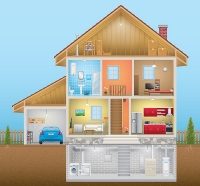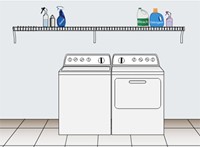Healthy Homes - Laundry Room
Health and safety tips
- Vent the clothes dryer outside the home to prevent mold and mildew inside.
- Clean lint out of the dry vent pipe to prevent fire.
- Keep cleaning supplies out of reach of children.
- Wash sheets and blankets in hot water to reduce allergens, such as dust mites.
- If you have a gas dryer or water heater, install a carbon monoxide monitor.
- Have gas appliances and furnaces checked regularly to make sure they are working properly and are vented to the outside.
- Do not let children play in washers or dryers.
Green tips
- Wash only full loads of clothes.
- Use a high-efficiency washing machine, if possible, to conserve water.
- Use EPA Energy Star qualified appliances to save money on your utility bill.
Dust mites
What They Are:
Dust mites are tiny bugs that are too small to see.
Where They Live:
Dust mites live in things like sheets, blankets, pillows, mattresses, soft furniture, carpets and your child’s stuffed toys.
What You Can Do:
- Wash bedding in hot water once a week. Dry completely.
- Use dust proof covers on pillows and mattresses.
- Vacuum carpets and furniture every week.
- Choose stuffed toys you can wash. Periodically wash stuffed toys in hot water and dry completely before your child plays with them.
Help Your Child Gain Control Over Asthma:
www.epa.gov/asthma/pdfs/ll_asthma_brochure.pdf
Household product safety
What’s in your laundry room cabinet? Learn more about what’s in these products, about potential health effects, and about safety and handling from the Consumer Product Information Database on the What's In It Website.
What is a kilowatt?
A kilowatt is a way to measure energy. When you use an electric range to cook for one hour, you use about 1,000 watt-hours (1,000 Wh) of electricity. One thousand watt-hours equals one kilowatt (kWh). Your utility bill usually shows what you are charged per kilowatt-hours used. In 2008, the average residential rate was 8.66 cents per kWh. A typical household in the United States consumes about 11,800 kWh per year. The average cost for someone in Tennessee would be about $1,022 per year.
Energy Star
ENERGY STAR is a joint program of the U.S. Environmental Protection Agency and the U.S. Department of Energy helping us all save money and protect the environment through energy efficient products and practices. Energy efficient choices can save families about a third on their energy bill with similar savings of greenhouse gas emissions, without sacrificing features, style or comfort. ENERGY STAR helps you make the energy efficient choice.

Additional resources
Tennessee Department of Health
Environmental Health Topics
www.tn.gov/health/cedep/environmental/environmental-health-topics/eht.html
U.S. Department of Housing and Urban Development (HUD)
Help Yourself to a Healthy Home
https://www.hud.gov/sites/documents/DOC_11880.PDF
U.S. Environmental Protection Agency (EPA)
Help Your Child Gain Control Over Asthma
https://www.epa.gov/asthma
ENERGY STAR
www.energystar.gov
